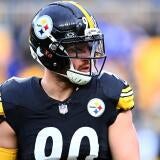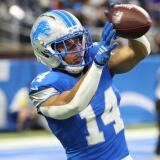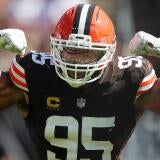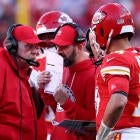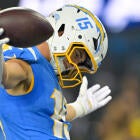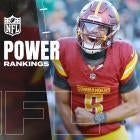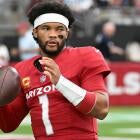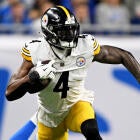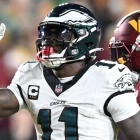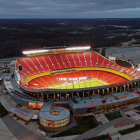
Super Bowl 2020: Jimmy Garoppolo's unique path to Super Bowl LIV, and eight other QBs who took unusual roads
Garoppolo will make NFL history before taking his first Super Bowl snap
There have been several improbable Super Bowl starting quarterback stories over the years, but Jimmy Garoppolo's is unlike any other.
Garoppolo, who helped lead the 49ers to an appearance in Super Bowl LIV, is the first quarterback to start in the Super Bowl who was traded after not getting an opportunity to start for his original team. The Patriots' second-round pick in the 2014 draft, Garoppolo threw just 94 passes during his three-plus seasons in New England -- which included two starts early in the 2016 season while Tom Brady was suspended -- before being traded to the 49ers during the 2017 season. And after an injury wiped out most of his 2018 season, Garoppolo is now looking to cap off his first full season as a starting quarterback with a Super Bowl ring.
While Garoppolo's Super Bowl story is truly unique, there are several other quarterbacks who took similar roads to the Super Bowl. Here's a look:
Super Bowl LIV is just days away and we've got a gambling preview worthy of the Big Game. Pete Prisco, R.J. White and Will Brinson break down their picks, props, DFS advice and more on the Pick Six Podcast. Listen below and be sure to subscribe for daily NFL goodness fired into your eardrums.
Earl Morrall
After 12 up and down seasons, NFL journeyman Earl Morrall enjoyed a breakout season for the Colts in 1968. Playing in relief of Hall of Famer Johnny Unitas, Morrall led the NFL in touchdown passes while leading Baltimore to a 15-1 record heading into the Colts' matchup with the AFL champion Jets in Super Bowl III. The NFL's MVP that season, Morrall struggled against the Jets' defense, throwing three interceptions before getting benched in favor of Unitas late in Baltimore's 16-7 loss, which still stands as the most memorable upset in pro football history.
Two years later, it would Morrall who would relieve an injured Unitas in the Big Game. In Super Bowl V, Morrall replaced an injured Unitas with the Colts trailing the Cowboys, 13-6, in the second quarter. While the Colts' defense did most of the work, Morrall did his part in helping the Colts pull off a 16-13 victory, as he was the placeholder on Jim O'Brien's game-winning field goal.
In 1972, the 38-year-old Morrall was reunited with former Colts head coach Don Shula in Miami. After Bob Griese went down with an injury, Morrall led the Dolphins to 10 consecutive wins before being benched in favor of a healthy Griese in the AFC Championship Game. With Griese back under center, the Dolphins came from behind to defeat the Steelers before capping off their 17-0 season with a win over the Redskins in Super Bowl VII.
While he is lost in the shuffle of other past Super Bowl quarterbacks, Morrall's peculiar place in Super Bowl history should not be forgotten.
"When I look back on my coaching career and all the quarterbacks that I've coached, I've got Hall of Famers in Johnny Unitas, Bob Griese and now Dan Marino," Shula told the NFL Network back in 2006, "but Earl Morrall is in my personal Hall of Fame."
Craig Morton
The quarterback Morrall defeated in Super Bowl V, Craig Morton, also holds a bizarre piece in Super Bowl history. After being benched in favor of Roger Staubach during the 1971 season, Morton -- who watched Staubach lead Dallas to its first Super Bowl victory from the bench -- was shipped to the Giants during the 1974 season in exchange for a future pick that the Cowboys would use to select Hall of Fame defensive tackle Randy White. After winning just 8 of his 33 starts with the Giants, Morrall revived his career with the Broncos in 1977, leading Denver to a 12-2 record before defeating the Steelers and defending champion Raiders in the AFC Championship Game.
In Super Bowl XII, Morton became the first quarterback in NFL history to start against his former team in the Super Bowl. Morton, simply put, didn't fare well, going 4 of 15 for 39 yards with four interceptions. Adding insult to the Cowboys' 27-10 victory was the fact that White, who was acquired using the pick that sent Morton to New York, shared the Super Bowl MVP trophy with fellow defensive lineman Harvey Martin.
Vince Ferragamo
Like Garoppolo, Vince Ferragamo spent two seasons on the bench before making the most of his opportunity to play. After starter Pat Haden suffered a season-ending injury 10 games into the 1979 season, Ferragamo took over a 5-5 Rams team whose playoff hopes were on life support. After Ferragamo led the Rams to a 4-2 record down the stretch, Los Angeles clinched a playoff berth before upsetting the Cowboys and Buccaneers to advance to the franchise's first Super Bowl.
Ferragamo, the first quarterback in NFL history to start in a Super Bowl the season season after making his first start, helped lead the Rams to a 19-17 lead over the heavily favored, defending champion Steelers heading into the fourth quarter of Super Bowl XIV. But two clutch passes by Terry Bradshaw and a crucial interception from Ferragamo paved the way to Pittsburgh's 31-19 victory.
While he didn't pull off what would have been the Super Bowl's greatest upset since Namath's guaranteed win over the Colts, Ferragamo won the Steelers' respect.
"Ferragamo was the better quarterback today," Steelers center Mike Webster said after the game, via Sports Illustrated's Paul Zimmerman. "Overall, I'd have to say he did the better job."
Jim Plunkett
Unlike Garoppolo and Ferragamo, Jim Plunkett started plenty of games before he found his Super Bowl path in 1979, his ninth NFL season. At age 32, Plunkett, the former Heisman Trophy winner and first overall pick in the 1971 draft, was considered a bust after winning just 34 of his 53 starts in in five seasons with the Patriots and two years with the 49ers. But in 1980, an injury to starting quarterback Dan Pastorini five games into the season changed the trajectory of Plunkett's career.
The 33-year-old Plunkett led the Raiders to a 9-2 record to close out the regular season before leading Oakland to playoff wins over Houston, Cleveland, and San Diego before throwing three touchdown passes and taking home MVP honors in the Raiders' 27-10 win over Philadelphia in Super Bowl XV. Three years later, Plunkett led the Raiders to another Super Bowl upset, throwing a touchdown pass in Los Angeles' 38-9 thumping of the defending champion Redskins.
In the run-up to free agency, we’re looking back on some of the most memorable FA moments in Raiders history.
— Las Vegas Raiders (@Raiders) March 11, 2019
Jim Plunkett helped deliver the hardware. #RaiderNation pic.twitter.com/w2iuvasEgf
Doug Williams
Similar to Plunkett, Doug Williams was largely considered a former first-round disappointment heading into the 1987 season. After five productive seasons with the Buccaneers, leading them to an unlikely run to the NFC Championship Game in 1979, Williams, the NFL's only African American starting quarterback during that time, got into a nasty contract dispute with Buccaneers owner Hugh Culverhouse that ultimately led to Williams' departure from the NFL from 1983-85. Following several seasons in the United States Football League, Williams accepted a backup position with the Redskins in 1986. With Williams on the sideline, the Redskins advanced to the NFC title game before getting blown out by the eventual champion Giants.
The following season, despite losing both of his two starts during the regular season, Williams' play in relief duty earned him the starting job over Jay Schroeder heading into the postseason. After helping the Redskins win two tight playoff games, Williams enjoyed one of the most improbable performances in Super Bowl history. With the Redskins trailing 10-0 after one quarter, Williams threw four second quarter touchdowns while helping Washington take a 35-10 halftime lead. The first African American quarterback to win the Super Bowl as a starter, Williams' performance earned him the game's MVP award. Williams is also the only quarterback to win a Super Bowl as a starter after not winning any games during the regular season.
Doug Williams reached the mountaintop when he was named MVP in Super Bowl XXII. 🏔️#AFootballLife: Doug Williams airs TONIGHT on @nflnetwork!@redskins | #HTTR pic.twitter.com/ZuNCTNIHxR
— NFL Films (@NFLFilms) December 7, 2018
Jeff Hostetler
While Williams' story is one of relentless drive, Jeff Hostetler's story nearly didn't happen. Hostetler, Phil Simms' backup with the Giants since 1985, had told his wife that he was going to retire after the 1990 season after six years on the bench. But after Simms suffered a season-ending injury during the Giants' Week 15 loss to the Bills, it would be up to Hostetler to lead the Giants heading into the postseason.
Despite his inexperience as a starter, the Giants never lost a game with Hostetler under center that season. After two wins to close the regular season, New York destroyed the Bears before upsetting the defending two-time champion 49ers in one of the biggest upsets in playoff history. In Super Bowl XXV, Hostetler and the Giants trailed 12-3 early before rallying to edge the Bills in the smallest margin of victory (20-19) in Super Bowl history. After nearly retiring during the 1990 season, Hostetler, a Pro Bowler for the Raiders during the 1997 season, played another seven years before hanging up his cleats for good after the 1997 campaign.
Kurt Warner
While the '90s began with Hostetler's unlikely Super Bowl run, it ended with the story of Kurt Warner, a grocery store clerk just several years before breaking into the NFL in 1998. After playing in just one game as a rookie, Warner became the Rams' starting quarterback when Trent Green, acquired from the Redskins during the offseason, sustained a season-ending injury during the preseason. Green's injury was so traumatic to St. Louis that Rams head coach Dick Vermeil failed to keep his composure during a press conference announcing that Green's season was over.
"We will rally around Kurt Warner," Vermeil said through tears, "and we'll play good football."
The Rams didn't play good football. They played great football, while changing the way the game is played today. With Warner under center, the Rams, a four-win outfit the previous season, won 13 regular season game while clinching the No. 1 seed heading into the postseason. Warner won league MVP honors while leading an offense that earned the distinction as the "Greatest Show on Turf."
Recordemos al mejor show en el pasto sintético, a Kurt Warner y sus Rams de 1999 #TBT pic.twitter.com/aMXF3jDWUI
— NFL México (@nflmx) February 22, 2018
Warner and the Rams would go onto capture the franchise's first Super Bowl title by season's end, with Warner throwing for a then-record 414 yards in St. Louis' thrilling victory over the Titans. He would start in two more Super Bowls before earning induction into the Pro Football Hall of Fame in 2017.
Tom Brady
Warner's quest for a second Super Bowl win would be upended by none other than Tom Brady, a former sixth round pick out of Michigan who began his career in New England as the Patriots' fourth string quarterback. But after working his way up to No. 2 on the depth chart, Brady was promoted to starter after Drew Bledsoe suffered an injury two games into his second season. Brady would lead the Patriots to an 11-5 regular season record before defeating Oakland and Pittsburgh in the 2001 playoffs. A considerable underdog against Warner and the Rams, Brady orchestrated a last minute, game-winning drive that culminated in Adam Vinatieri's game-winning field goal. Brady has since won five more Super Bowls while becoming the most decorated quarterback of all-time.
Garoppolo, Brady's backup for two of his Super Bowl runs, now look to mimic Brady's success as a Super Bowl starter while adding his name next to the list of improbably Super Bowl winning quarterbacks.


